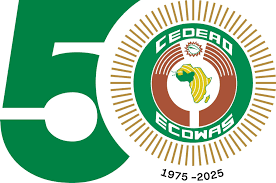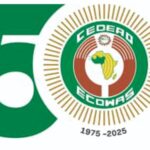ECOWAS: 50 Years of Changing Development Landscape, Promoting Transformationin W/Africa
By Raymond Enoch
Fifty Years ( 50) in the life of any Country, institution or an individual is remarkable and significant worthy of outstanding ovation and celebration
Paradigm News examines ECOWAS achievements, it’s impact transformational strides in the region and globally and writes on the following

Top in leading these transformation as ECOWAS journey through its history is H E Dr Omar Aliu Touray President ECOWAS Commission and his management team .
As background purpose we proceed by noting that the Economic Community of West African States (ECOWAS) was established May 28, 1975, with the signing of the Treaty of Lagos by 15 West African member countries to promote economic integration and cooperation among West African countries for regional development and stability.Founding Members included Benin, Burkina Faso, Côte d’Ivoire, Gambia, Ghana, Guinea, Guinea-Bissau, Liberia, Mali, Mauritania, Niger, Nigeria, Senegal, Sierra Leone, and Togo.Cape Verde joined in 1977, while Mauritania withdrew in 2000. With a revised treaty of (1993): in order to enhance political cooperation, security, and democratic governance alongside economic integration.
The giant West African institution therefore have ambitiously embarked on achieving it’s objectives by creating several institutions headquartered in Abuja, Nigeria, which is its administrative capital.
One of such leading institution is the ECOWAS Parliament also known as the Community Parliament, it serves as an advisory legislative body for member states.
There is also the ECOWAS Court of Justice which handles disputes related to ECOWAS treaties and human rights violations.
Another landmark achievement is ECOWAS Bank for Investment and Development (EBID) which provides financial support for development projects within the region.
There is also the ECOWAS Peace Fund that supports peacekeeping and conflict resolution initiatives.
Still counting the ECOWAS achievements and impact is it’s establishment of the Centre for Renewable Energy and Energy Efficiency (ECREEE) that promotes sustainable energy solutions in West Africa.
These institutions play a crucial role in regional integration, economic development, and peacekeeping efforts in West Africa.
To ensure regional integration and balance ECOWAS cited in Accra, Ghana the
West African Monetary Agency (WAMA) which
works on monetary integration and the establishment of a single currency for West Africa .There is also the ECOWAS Gender Development Centre also in Accra to promote
gender equality and women’s empowerment in the region. Further still in Lome, Togo ECOWAS Bank for Investment and Development (EBID) is cited to support infrastructure, industry, and social projects.
In Ivory Coast (Côte d’Ivoire) the West African Health Organization (WAHO) is cited in Bobo-Dioulasso to coordinate regional health policies, epidemic response, and public health programs.
In Burkina Faso
West African Power Pool (WAPP) is located in Ouagadougou supporting
works on energy integration and improving electricity access across West Africa.
In Cape Verde
ECOWAS has Centre for Renewable Energy and Energy Efficiency (ECREEE) Praia working in promoting sustainable energy solutions and regional energy policies.
In Guinea-Bissau
ECOWAS Mission in Guinea-Bissau (ECOMIB) Bissau supporting political stability, peacekeeping, and security sector reform.
In Senegal Inter-Governmental Action Group against Money Laundering in West Africa (GIABA) – Dakar is working on anti-money laundering and counter-terrorism financing initiatives in the region.in Liberia
ECOWAS Radio – Monrovia a media platform for disseminating information on ECOWAS activities, regional integration, and peace promotion.
These institutions support ECOWAS’s mandate in economic integration, peacekeeping, security, energy, and governance.
On the whole ECOWAS in 50 Years (1975–2025)
have played a crucial role in economic integration, peacekeeping, political stability, and regional development across West Africa. The introduction of Economic Integration & Trade Liberalization Scheme (ETLS) facilitated free trade among member states.
Common External Tariff (CET) helped harmonize trade policies gearing up to the efforts toward a single currency (“ECO”) with a remarkable progress for full implementation an effort which is only pending. Free Movement & Regional Connectivity
Introduced visa-free travel and ECOWAS passports, allowing citizens to move freely.
Developed key road and infrastructure projects, like the Lagos–Abidjan highway. Peacekeeping & Security through the instrumentality of ECOWAS Monitoring Group (ECOMOG) that intervened in Liberia, Sierra Leone, Guinea-Bissau, and The Gambia which prevented disintegration Notable on the ground now is the
Strengthened ECOWAS Early Warning and Response Network (ECOWARN) for conflict prevention. Governance & Democracy
Played a role in election monitoring and democracy restoration, preventing unconstitutional changes of government.
Established the ECOWAS Court of Justice to uphold human rights and community laws. Social & Human Development
West African Health Organization (WAHO) led responses to health crises like Ebola and COVID-19.
ECOWAS Gender Development Centre promoted women’s empowerment and social inclusion.
ECOWAS Youth and Sports Development Centre invested in youth capacity-building.
The ECOWAS Celebrations of 50 Years in indeed a celebration of an opportunity to assess ECOWAS’s journey over the past five decades and to strategize for the future, reinforcing commitments to regional cooperation and development.









